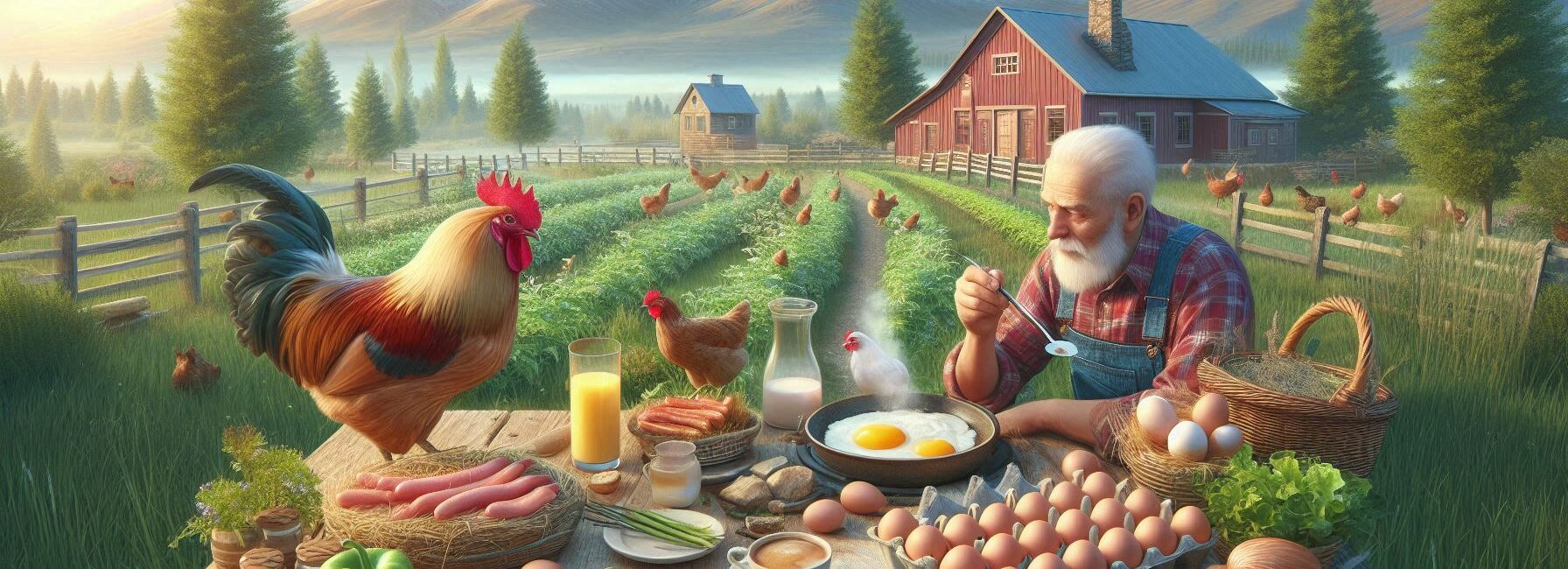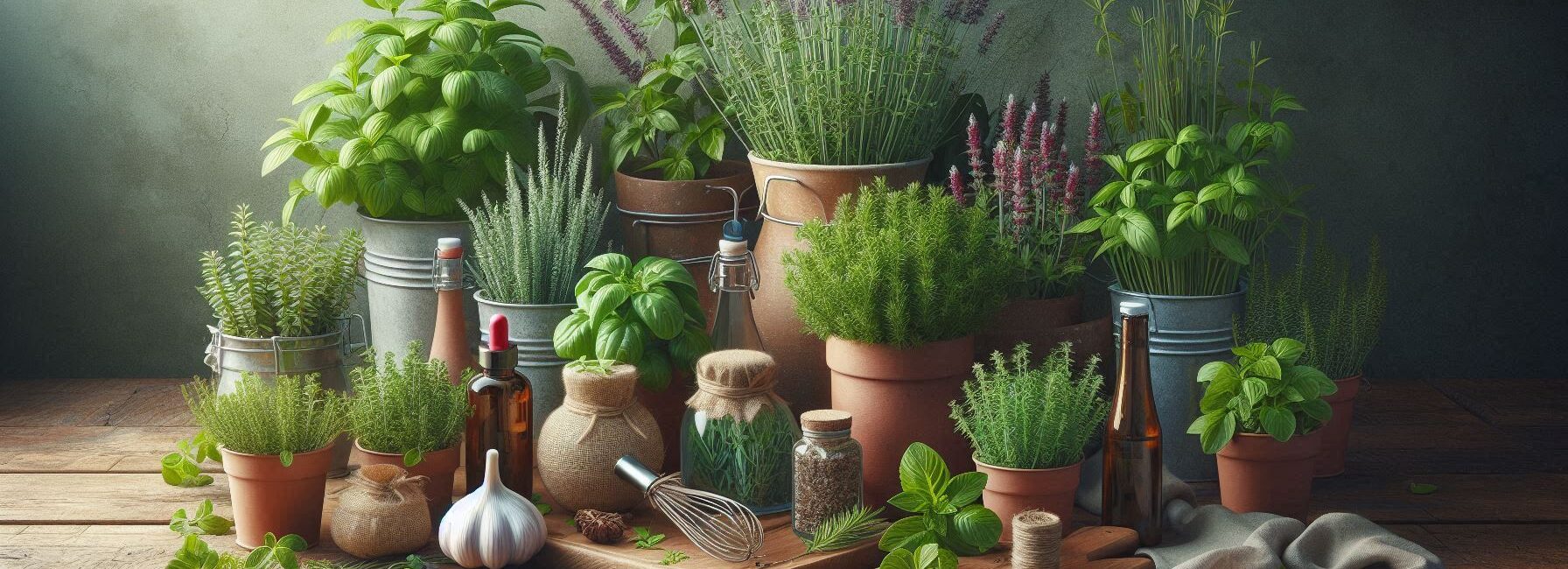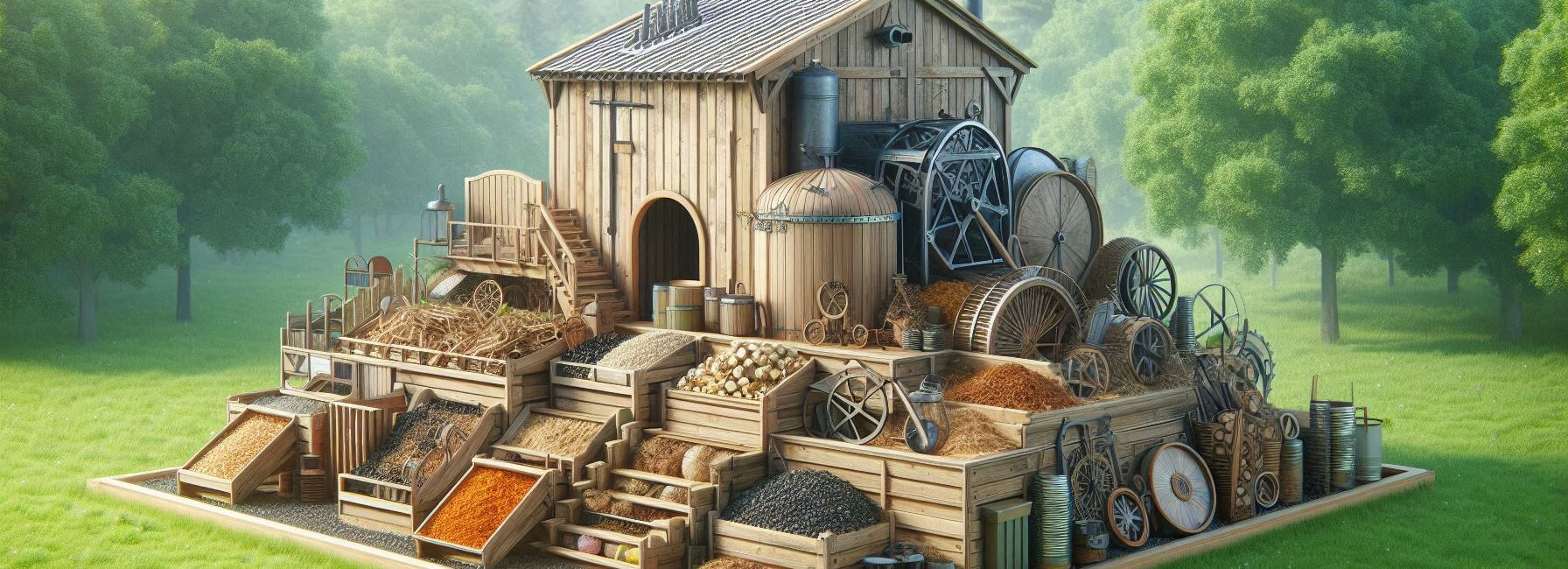Last Updated on November 1, 2025 by Kevin Collier

Top Takeaways and Key Concepts
Drying Meat: Slice meat thinly and dry using heat sources like fire, dehydrators, or ovens.
Canning Meat: Use pressure canning to sterilize and seal meat in jars for long-term storage.
Salting Meat: Apply salt to meat to draw out moisture, inhibiting bacterial growth.
Smoking Meat: Expose meat to smoke to preserve it and add flavor.
Raising Livestock: Keep animals like pigs or goats for a sustainable meat source.
So, you want to grow your own meat? That sounds like a lot of fun! Deciding to do it without a refrigerator? That's a bold move! You're going on a whole new journey. It's like turning into your own little food superhero.
You may be asking yourself, “How do I keep my meat fresh?” That's a great question! It sounds harder than it is. There are amusing and old-fashioned methods to achieve this. You may try drying, smoking, or even pickling. Every method has its own appeal. You will feel quite cool turning regular flesh into tasty treats.
Please Note: This post may contain affiliate links. If you click one of them, we may receive a commission at no extra cost to you. As an Amazon Associate, I earn from qualifying purchases.
Let's begin with drying. This one is easy. Like creating jerky out of meat! Cut your meat into thin strips, add your chosen spices, and let it dry in the sun in a warm oven. It's like magic to see the dampness go away. And guess what? In the end, you get delightful goodies!
Now it's time to smoke. This one seems fancy, but it's really simple. You can be creative with a smoker or grill. Just add wood chips, and the appropriate taste will get into your meat. It tastes great with a smokey flavor that's hard to resist. Think of a BBQ with a twist!
Pickling adds a fun element as well. You can soak pieces of meat in salty water. It will taste different and stay fresh since it keeps bacteria away. You can eat it like a science project!
You might be wondering, “What about safety?” That's completely true. Clean up after yourself. Make sure you store your meat in a cool, dry place. It can make a big difference if you clean the surfaces. You can do this!
It's also important to keep your inventions safe. Use vacuum bags or jars. Keep bugs away. It will keep you from finding strange things later on.
It can seem like a major job to keep meat fresh. It's reasonable to think about whether or not you're doing it right. Take it one step at a time. Have fun learning and trying new things. In no time, you'll get the hang of it.
Keep in mind that this is your adventure. Enjoy it! Laugh at the small mistakes and enjoy your wins. Making your own meat is worth it. You'll soon be the ruler of your own meaty empire!
*** Shop for Survival Gear - Tools - Kits ***
Survival Gear - Bags and Backpacks - Knives - Boots/Footwear - Communication
Outdoor Cooking - Gloves - Hydration - Dry Boxes - Water Filtration Systems
Tents - Sleeping Bags - First Aid Kits - Multi-Tools - Flashlights - Fire Starters
Navigation - Survival Food - Night Vision - Headlamps - Stun Guns - Binoculars
Choosing Your Meat Sources Wisely
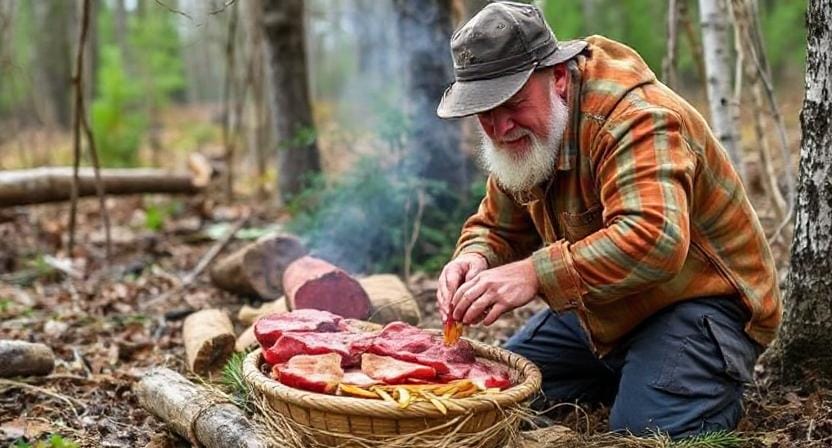
First things first: what kind of meat are we talking about? It can feel like a reality show when people are attempting to outsmart each other while simultaneously not getting voted off the island as they raise animals for sustenance. Choosing the correct animals for your needs is the most important thing.
Chickens are a great choice because they are the “overachievers” of the barnyard. They not only provide you eggs (which are great for omelets or snacks on the go), but they also give you tender meat that makes your mouth water just thinking about it.
They also know how to turn kitchen trash into tasty protein, which is the best kind of recycling!
Then there's pork. Pigs are like walking garbage disposals that transform leftover food into bacon. Yes, please! But let's see—pigs need more room and care than chickens do. If you don't have a lot of area or time, you might want to stick with chickens.
And don't forget about bunnies! They have babies faster than you can ask, “What's for dinner?” People don't frequently think about raising rabbits, yet these fluffy animals are great for the environment and taste great. Just keep in mind that if you name them, you might have to make a moral choice later.
Making a Place For Your Animals To Live And Stay
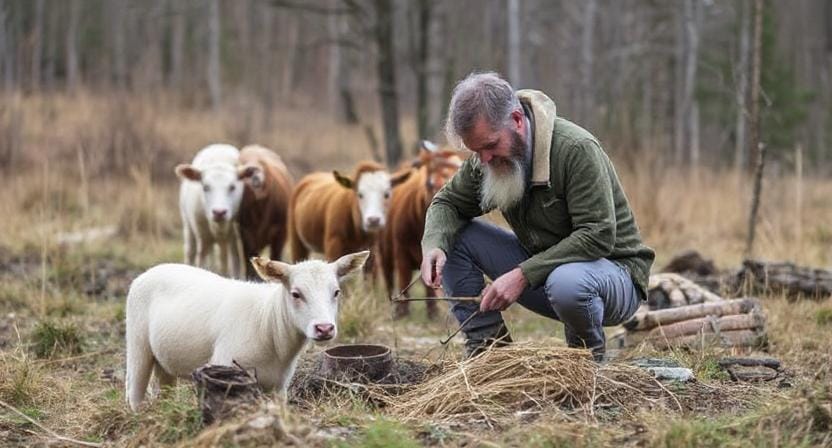
It's time to think about how your animals will live now that you've chosen which ones will live on your property. No one wants their future dinner to be going around without protection like it's trying out for “America's Next Top Model.”
Start by making safe enclosures that keep off predators, including raccoons in ninja masks or coyotes with big plans to get into your yard. Chickens need a coop that keeps them safe at night and lets air flow through it on hot days. After all, who wants a sweating chicken?
Make sure pigs and rabbits have enough space to move about without feeling trapped. If they don't, they might plan their escape like little furry Houdinis. As a general guideline, each rabbit should have at least 10 square feet of space, and each piglet should have at least 20 square feet.
Adding some natural things like trees or bushes will assist make shade and also make your animals' life better (and deter them from scheming against you). Believe me, animals who are happy taste better!
How to Feed Your Animals in a Way That Lasts
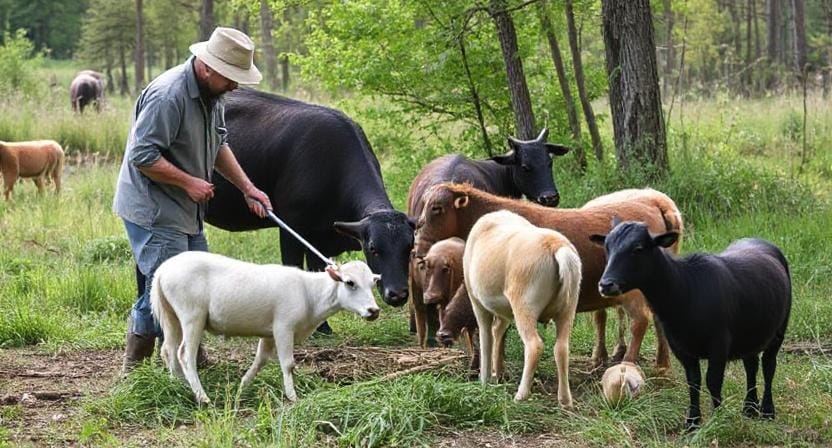
It's time to talk about food, which is an important part of any survival plan, once you've made your animals' quarters cozy. You should give them a lot of food so they can get strong enough to be part of your great meal.
One choice is to produce animal feed crops like corn or alfalfa. This way, you may choose what they eat. Just picture yourself picking fresh greens while humming “The Circle of Life.” The extra? You can buy additional honey jars with the money you save by not buying commercial feeds.
Also think about kitchen scraps. Yes, those leftover vegetables could be turned into gourmet meals for your pigs or chickens instead of going directly into the compost pile. Recycling food waste not only cuts down on trash, but it also helps keep expenses down.
Oh, and don't forget about water! Animals who are thirsty not only drink more, but they also taste better when cooked (really!). who's why there should always be clean drinking water.
Keeping Your Hard-Earned Meat
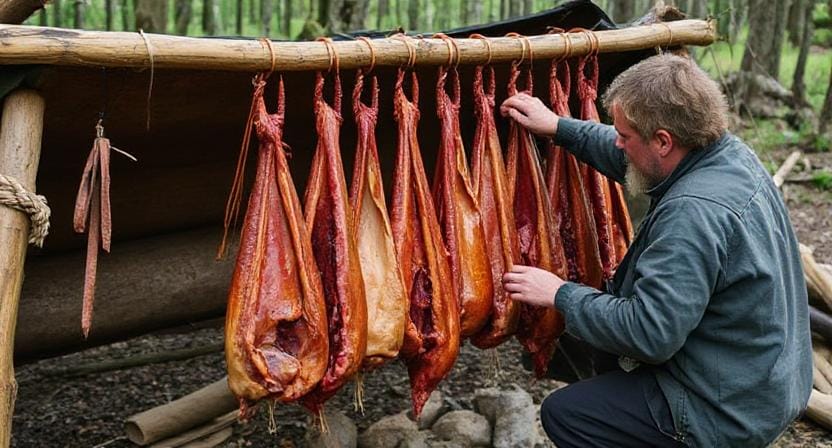
It's now time to turn these beautiful animals into food that doesn't need to be kept cold after all the hard effort of nurturing them and getting attached to them. Now that we've gotten a little dark (insert sad music), know this: there are ways to keep meat fresh that don't use electric cooling systems.
Drying is a common method that has been used for a long time. It's like making beef jerky, but you don't need costly vacuum sealers or dehydrators. Cut thin strips from muscle parts, like beef, and soak them in a brine of saltwater and spices until they are properly flavored. Then, hang them up somewhere dry.
Another good way to do this is to smoke meats using wood chips or sawdust. There's nothing like hanging sausages near an open fire to bring out your inner pioneer spirit! If you keep smoked meats in a cold, dark spot where bugs can't get to them, they can last for months.
If you have a pressure cooker, you can can cooked meats, which gives you another alternative. You'll have hearty stews waiting on cupboard shelves anytime you become hungry!
Using Every Part of Your Animal
Finally, and this is very important, follow the idea of using every part of your animal after it has been processed instead of throwing anything away that isn't needed (save for undesired organs, which we will let slip). This habit helps the environment and makes sure that nothing goes to waste!
You may boil bones down into rich broths that are great for soups or sauces. These are the kinds of broths that warm you up inside and out while you're camping under the stars or just huddled up indoors. Fat that comes from cooking gives taste to vegetables as well!
Don't forget about skinning choices either. If hides are treated appropriately, they might become leather items, which would save you money and give you unique crafting chances.
Raising animals is more than just making good food. It's like making friends with animals and the world around you. Think about how nice it would be to get to know a small goat or a fluffy fowl. They can make your day so much better!
Taking care of them teaches you a lot. You learn how to be responsible. Taking care of them by feeding them, cleaning their spaces, and making sure they are healthy. It's like having little friends you have to look after. And that feels great.
Those talents come in very handy if something goes wrong, like a hurricane. You learn to be quick on your feet. How to keep animals safe. How to adapt your plans when they do. It's like you're getting ready for the tiny surprises that life throws at you.
Being among animals also links you to the land. You start to see how the seasons change things. It's cool to watch your crops grow next to your animals. It's actually a group effort. You and the land working together.
When large disasters happen, having worked with animals before can help a lot. You're not only thinking about eating. You are trying to keep calm and figure out how to get help. Knowing you're ready offers you a sense of tranquility.
Also, caring for animals can bring people together. Friends might wish to lend a hand. You'll tell stories and laugh together. Picture having a barbecue with the meat you grew! Sharing with your neighbors makes you feel like you're part of a community.
Isn't it interesting? How caring for those animals helps you meet new people. It teaches important skills and helps people get closer to each other.
The most important thing is to enjoy the journey. Enjoy the small victories. You can really feel alive when you learn about animals and environment. It sounds like a lot, but every moment has its own happiness.
So, if you want to do something, go for it! You're not just growing food; you're also making friends. And those connections can really transform your life.
Frequently Asked Questions
What meat preservation method lasts longest without refrigeration?
Drying and smoking can last months if kept dry and protected from pests, and pressure-canned meat can last even longer when jars remain sealed.
Is salting meat safe for long-term storage?
Yes. Salt reduces moisture and inhibits bacterial growth, but proper ratios and fully coated surfaces are essential for safety.
Can you preserve any meat by drying?
Lean cuts work best because excess fat can spoil. Thin slicing and consistent heat or airflow improve results.
Do smoked meats require refrigeration?
If adequately dried and kept in a cool, dark, pest-free environment, smoked meats can remain shelf-stable without refrigeration.
Why pressure can meat?
Pressure canning raises internal temperatures high enough to destroy pathogens and seal jars for extended safe storage.
What animals are easiest for beginners to raise?
Chickens and rabbits require limited space, reproduce quickly, and provide manageable meat yields for new homesteaders.
How important is sanitation during meat processing?
Very. Clean surfaces, tools, and containers reduce pathogen risk and greatly increase preservation success and shelf life.
Suggested Resources:
Raising Chickens for Dummies
https://www.dummies.com/article/home-auto-hobbies/pets/raising-chickens-for-dummies-203579/
The Backyard Homestead: Produce All the Food You Need on Just a Quarter Acre
https://www.amazon.com/Backyard-Homestead-Producethe-Food-Quarter/dp/1603421388
Basic Butchering of Livestock & Game
https://www.amazon.com/Basic-Butchering-Livestock-Game/dp/0760340311

Kevin Collier is a seasoned survivalist and expert in prepping and homesteading, contributing to WiseSurvive.com. With a deep-rooted passion for self-sufficiency and outdoor survival skills, Kevin shares practical advice, strategies, and resources to help individuals prepare for any challenge. His informative articles cover a range of topics, from essential survival techniques to sustainable living practices, empowering readers to thrive in any situation. Whether you're a novice or a seasoned prepper, Kevin's insights will inspire you to take charge of your readiness and build resilience for the future.


